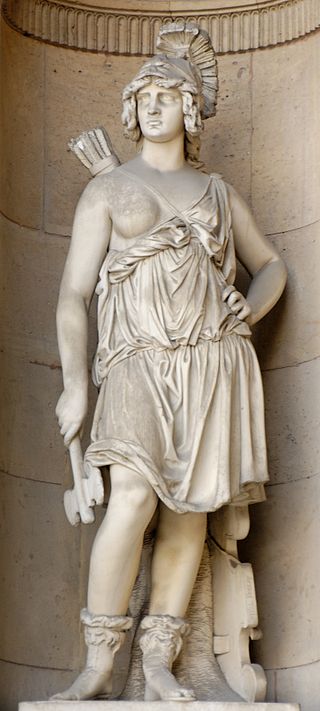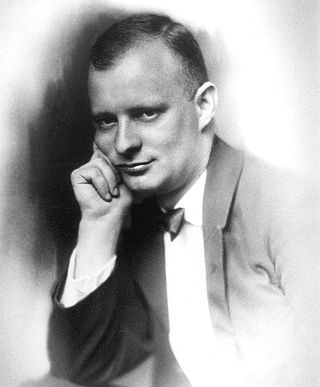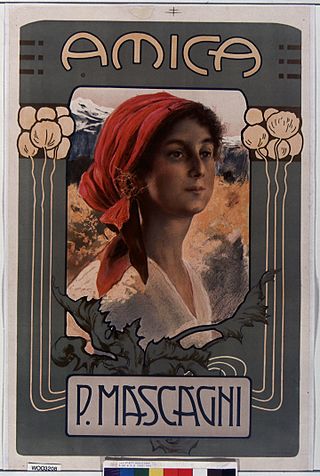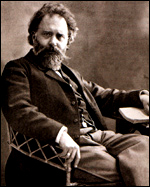Related Research Articles

Penthesilea was an Amazonian queen in Greek mythology, the daughter of Ares and Otrera and the sister of Hippolyta, Antiope and Melanippe. She assisted Troy in the Trojan War, during which she was killed by Achilles. The asteroid 271 Penthesilea, discovered in 1887, was named in her honor.

Othmar Schoeck was a Swiss Romantic classical composer, opera composer, musician, and conductor.

Mathis der Maler is an opera by Paul Hindemith. The work's protagonist, Matthias Grünewald, was a historical figure who flourished during the Reformation, and whose art, in particular the Isenheim Altarpiece, inspired many creative figures in the early 20th century.

The Merry Wives of Windsor is an opera in three acts by Otto Nicolai to a German libretto by Salomon Hermann Mosenthal based on the play of the same name by William Shakespeare.

Schwanda the Bagpiper, written in 1926, is an opera in two acts and five scenes, with music by Jaromír Weinberger to a Czech libretto by Miloš Kareš, based on the drama Strakonický dudák aneb Hody divých žen by Josef Kajetán Tyl.

Eine florentinische Tragödie, Op. 16, is an opera in one act by Alexander von Zemlinsky composed in 1915–16 to a libretto adapted by the composer from a German translation by Max Meyerfeld of Oscar Wilde's unfinished play A Florentine Tragedy.

Doktor Faust is an opera by Ferruccio Busoni with a German libretto by the composer, based on the myth of Faust. Busoni worked on the opera, which he intended as his masterpiece, between 1916 and 1924, but it was still incomplete at the time of his death. His pupil Philipp Jarnach finished it. More recently, in 1982, Antony Beaumont completed the opera using sketches by Busoni that were previously thought to have been lost. Nancy Chamness published an analysis of the libretto to Doktor Faust and a comparison with Goethe's version.

Penthesilea is an 1808 tragedy by the German playwright Heinrich von Kleist about the mythological Amazon queen, Penthesilea, described as an exploration of sexual frenzy. Goethe rejected it as "unplayable". It was first performed on 25 April 1876 at the Königliches Schauspielhaus in Berlin, 65 years after the author's death.

Hans Heiling is a German Romantic opera in 3 acts with prologue by Heinrich Marschner with a libretto by Eduard Devrient, who also sang the title role at the première at the Königliche Hofoper, Berlin, on 24 May 1833. From there, the work went on to become Marschner's most successful opera. The opera brought the composer a considerable reputation, although this did not materially affect his position in Hanover, where he was music director of the Court Theatre. Like Marschner's other great success, Der Vampyr, the plot of Hans Heiling makes great use of supernatural elements. As with several of his operas, Hans Heiling is based on a folk legend.
Il prigioniero is an opera in a prologue and one act, with music and libretto by Luigi Dallapiccola. The opera was first broadcast by the Italian radio station RAI on 1 December 1949. The work is based on the short story La torture par l'espérance from the collection Nouveaux contes cruels by the French writer Auguste Villiers de l'Isle-Adam and from La Légende d'Ulenspiegel et de Lamme Goedzak by Charles De Coster. Some of the musical material is based on Dallapiccola's earlier choral work on a similar theme, Canti di prigionia (1938). Dallapiccola composed Il prigioniero in the period of 1944–1948. The work contains seven parts and lasts about 50 minutes. The musical idiom is serialism, and it is one of the first completed operas using that compositional method.

Cardillac, Op. 39, is an opera by Paul Hindemith in three acts and four scenes. Ferdinand Lion wrote the libretto based on characters from the short story Das Fräulein von Scuderi by E. T. A. Hoffmann.

Amica is an opera in two acts by Pietro Mascagni, originally composed to a libretto by Paul Bérel. The only opera by Mascagni with a French libretto, it was an immediate success with both the audience and the critics on its opening night at the Théâtre du Casino in Monte-Carlo on 16 March 1905. Mascagni himself conducted the performance. The opera had its Italian premiere on 13 May 1905 at the Teatro Costanzi in Rome.

Der Evangelimann is an opera in two acts by the Austrian composer Wilhelm Kienzl. The libretto, by the composer, is based on Leopold Florian Meissner's short story "Aus den Berichten eines Polizeikommissärs". It was adapted in 1924 as a silent film The Evangelist.

Hulda is an opera by César Franck to a French libretto by Charles Grandmougin. It is set in 11th-century Norway, and is based on the play Lame Hulda (1858) by Norwegian writer Bjørnstjerne Bjørnson. The complete opera contains a prologue, three acts and an epilogue, albeit the world premier recording by Naxos has five acts. It was composed between 1879 and 1885.

The Sinfonieorchester Basel is a symphony orchestra based in Basel, Switzerland. Its principal concert venue is the Musiksaal of the Stadtcasino. In addition, the orchestra accompanies ballet and opera productions with Theater Basel, and records prolifically, often for Sony Classical.
Albin Swoboda Jr. was a German operatic bass-baritone. Born in Dresden, he was the son of tenor and actor Albin Swoboda Sr. and soprano Friederike Fischer; both of whom were luminaries of the "Golden Age" of Viennese operetta. His grandfather, Joseph Wilhelm Swoboda, also had an important career as a tenor and opera director in Vienna. In 1910 he became romantically involved with opera singer Anna Sutter. Sutter had broken off a relationship with conductor Aloys Obrist around the same time, and Obrist became highly distraught by the situation. On 29 June 1910, Obrist broke into Sutter's apartment, murdered her, and committed suicide in the presence of Swoboda who was unable to stop him.
Barbara Scherler is a German classical mezzo-soprano and contralto singer in opera and concert. She was a member of the Deutsche Oper Berlin and active in performances and recordings of operas of the 20th century.
William Leonard Blankenship was an American operatic tenor, music pedagogue at the collegiate level, stage and television actor, and stage director.

Zingari (Gypsies), also known as Gli Zingari, is an opera in two acts by Ruggero Leoncavallo. The libretto by Enrico Cavacchioli and Guglielmo Emanuel is based on The Gypsies, an 1827 narrative poem by Alexander Pushkin. The opera premiered on 16 September 1912 at the Hippodrome Theatre in London. The United States premiere of the opera was staged by the Chicago Grand Opera Company in 1913 with soprano Carolina White as Fleana.
Iris Vermillion is a German operatic mezzo-soprano. A member of the Deutsche Oper Berlin from 1988, she has enjoyed an international career, appearing in Amsterdam with Nikolaus Harnoncourt and at the Salzburg Festival, among others.
References
- ↑ Peter Palmer, Review of Othmar Schoeck: eine Biographie by Chris Walton (translated Ken W. Bartlett). Music & Letters , 77(2), pp. 293–295 (May 1996)
- ↑ Holloway, Robin, "Schoeck the Evolutionary" (October 2001). Tempo (New Ser.), 218: pp. 2–6.
- Casaglia, Gherardo (2005). "Penthesilea, 8 January 1927" . L'Almanacco di Gherardo Casaglia (in Italian).